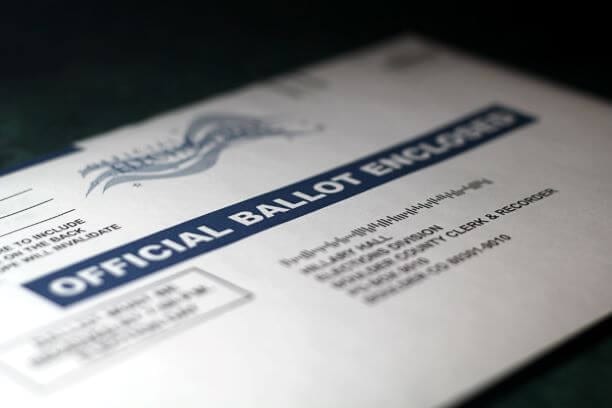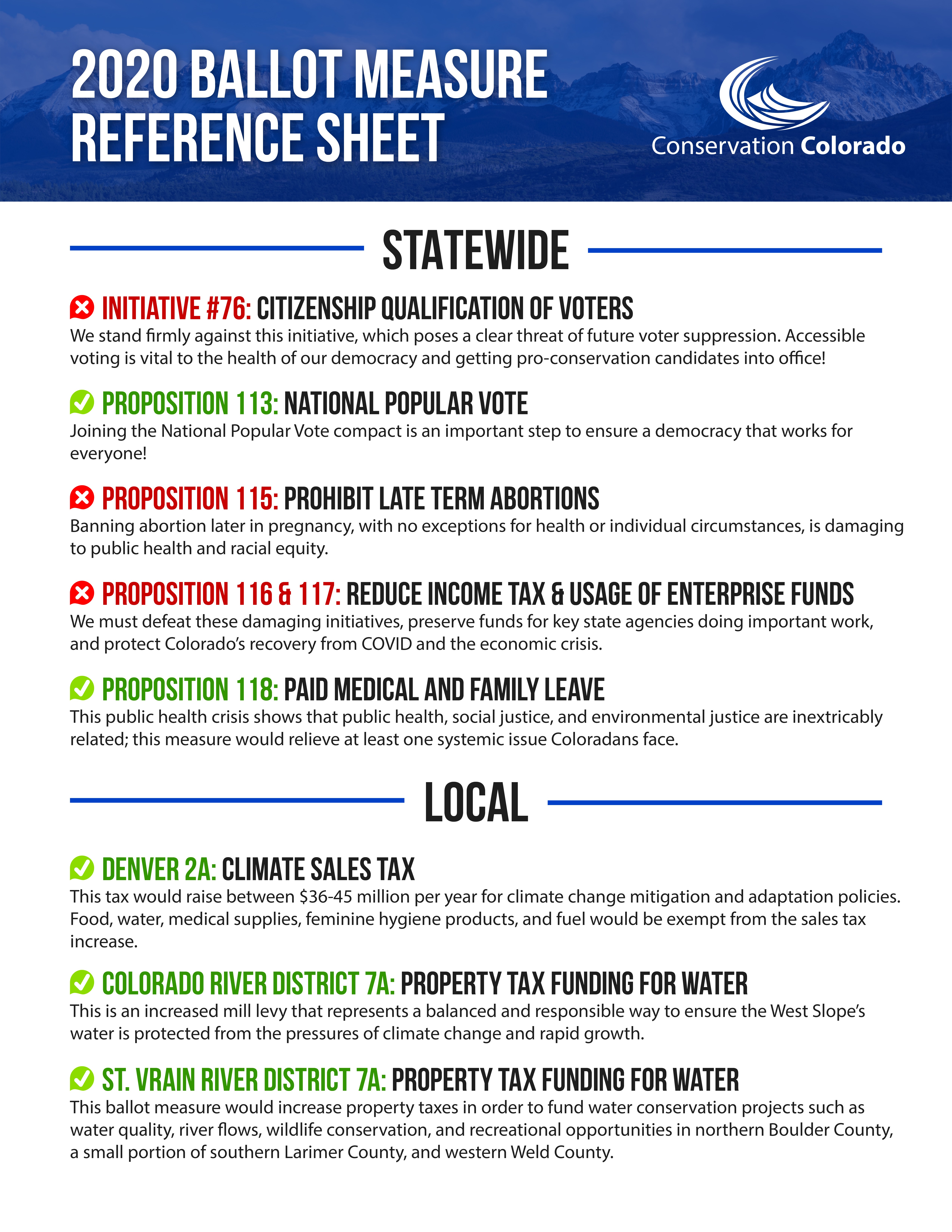Public lands and climate change are some of the issues I care most about. I could no longer sit on the sidelines and had to get directly involved with this work.
Conservation Colorado was able to move the conservation agenda leaps and bounds forward to address the urgent problems caused by climate change, while bringing equity and justice to the forefront.
Today’s historic announcement makes Congresswoman Deb Haaland the first Native American in U.S. history to be nominated to serve as Interior secretary.
Go behind the scenes of Conservation Colorado’s work with Front Range Field Manager, Renée Larrarte!
New changes position Colorado as a national leader in protecting people and wildlife through commonsense oil and gas regulation.
New polling shows the key role of conservation issues in the 2020 election and Coloradans’ desire for state-level climate action in 2021.
From the presidential race down to local initiatives, Coloradans voted to support our climate and our communities.
There are many things to watch on election night in 2020, both in Colorado and nationally. Here are five things we will be watching.
Coloradans — in the midst of a global health crisis and on the heels of our worst wildfire season ever — overwhelmingly want climate leadership.
It’s 2020 and the stakes of the election could not be higher.
It is more clear than ever that leadership matters. We must elect leaders who will fight climate change, who value the health of our communities and our environment, and who will challenge racists practices. You can find out which candidates Conservation Colorado has endorsed here.
But ballot initiatives — the policies that you, as a voter get to decide — are also critical to the future of our state. This year, Conservation Colorado recommends the following positions on general election ballot measures (see more details as to why below):
Statewide Measures
🚫 Initiative 76: Citizenship Qualification of Voters – NO

Proposition 114: Wolf Reintroduction – NEUTRAL
🚫 Proposition 115: Prohibit Late Term Abortions – NO
🚫 Proposition 116: Reduce State Income Tax – NO
🚫 Proposition 117: Restrict the Usage of Enterprise Funds – NO

Local Measures



Here are more details on the ballot measures we’ve taken positions on, in the order that they will appear on your ballot.
No to Citizenship Qualification of Voters
 🚫 Initiative 76 – NO
🚫 Initiative 76 – NO
We stand firmly against this initiative, which is purely a messaging tactic to energize anti-immigrant voters in the 2020 election and poses a clear threat of future voter suppression. Accessible voting is vital to the health of our democracy and getting pro-conservation candidates into office!
Yes to National Popular Vote

In 2019, Colorado passed legislation signed by the governor to join the National Popular Vote (NPV) interstate compact. Following its passage, a coalition gathered signatures to place a “veto referendum” on the ballot, marking the first time since 1932 that Colorado will have a veto referendum on the ballot.
Joining the NPV compact is an important step to ensure a democracy that works for everyone!
Neutral on Wolf Reintroduction
Proposition 114 – Neutral
Gray wolves were native to Colorado and the return of this iconic species to our state benefits Colorado’s environment. Conservation Colorado supports the restoration of wolves across Colorado, and reintroduction can accelerate restoration.
However, given our longstanding land and water conservation priorities in western Colorado and our work with rural allies to achieve them, we have chosen to remain neutral on Proposition #114.
If passed , we will work with the Department of Natural Resources and Colorado Parks and Wildlife, as well as with affected communities, to develop and implement the required reintroduction and management plan to create a viable, self-sustaining future for wolves throughout all of Colorado. We strongly encourage the legislature to provide sufficient funding for both rangeland management programs and compensation for livestock producers for losses proven to be caused by wolves.
No to Prohibiting Late Term Abortions
🚫 Proposition 115 – NO
This intentionally confusing ballot measure would ban abortion later in pregnancy, with no exceptions for health or individual circumstances. Proponents of this ballot measure have said outright they want to force a woman to carry a pregnancy to term — even in cases of rape, risks to the woman’s health or a lethal fetal diagnosis. This is an important public health and racial equity issue.
No to Reducing State Income Tax and Restricting the Usage of Enterprise Funds
🚫 Proposition 116 – NO
🚫 Proposition 117 – NO
It takes money to do good work on the environment. Every year, the key state agencies that protect our Colorado way of life — including the Colorado Department of Public Health and the Environment, Department of Natural Resources, and the Colorado Energy Office — receive funds to do their important work, and this measure would severely hamper critical work on climate, oil and gas, and protecting our public lands and waters. We must defeat these damaging initiatives and protect Colorado’s recovery from COVID and the economic crisis.
Yes to Paid Medical and Family Leave

The COVID-19 pandemic has worsened the systemic injustices faced by Colorado’s communities of color. Without access to paid leave for illnesses that can be caused by pollution, and forced to choose between work and family, frontline communities and communities of color are hit particularly hard. This public health crisis shows that public health, social justice, and environmental justice are inextricably related; this measure would relieve at least one systemic issue Coloradans face.
Yes to Climate Sales Tax

The measure would increase the sales tax in Denver by 0.25 percent, or 2.5 cents on every $10 to be spend on climate change mitigation and adaptation policies. Food, water, medical supplies, feminine hygiene products, and fuel would be exempt from the sales tax increase. The tax would raise between $36-45 million per year depending on the amount of money that Denverites spend on goods.
The money would be used to fund Denver’s Climate Action Program, specifically job creation in renewable and clean energy technologies, increased investments in solar and renewables, neighborhood-based environmental and climate justice programs, adaptation and resiliency programs that help communities prepare for a changing climate, programs and services that provide affordable and reliable transportation choices, and energy efficiency upgrades.
Yes on Property Tax Funding for Water (West Slope)

This is an increased mill levy that represents a balanced and responsible way to ensure the West Slope’s water is protected from the pressures of climate change and rapid growth. The Colorado River District has specific plans to use this money on the West Slope to protect clean drinking water supplies, healthy habitats for fish and wildlife, recreation opportunities, and water for farmers and ranchers. It would provide almost $5 million annually to be leveraged with state and federal dollars on projects that have been identified as important priorities for local communities.
Yes on Property Tax Funding for Water (Northern Front Range)

This ballot measure would increase property taxes in order to fund water conservation projects such as water quality, river flows, wildlife conservation, and recreational opportunities. This river district, which encompasses northern Boulder County, a small portion of southern Larimer County, and western Weld County. This is the first time in the 50-year history that the district has asked voters for a mill levy increase. A volunteer board of local residents will oversee spending with the tax sunsetting/expiring in 10 years, and the district will publish an annual public expenditure report/audit identifying the various uses of funds.

SUPPORT OUR WORK
Join Us
Our community of members are the driving force behind environmental wins from your backyard to the state Capitol.



